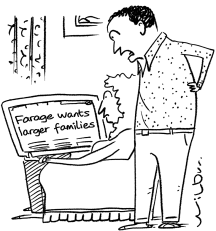
You may have noticed that for some while the BBC News people have stopped referring to Reform UK as ‘far right’ or ‘hard right’. That’s not because Nigel Farage has tacked to the left a little on such policies as nationalisation; one characteristic of the left is that if they consider you ‘far right’, they will not commend anything you say, even if they fervently agree with it. You will never gain their favour, even if you join Greta Thunberg on her stupid and narcissistic boat expedition to Gaza and then pronounce your solidarity with all trans folk. This is one of the mistakes often made by people who are right of centre and have said or done something that has aroused the fury of the left-wing mob. Apologising will not make things better for you; it will simply be used to convict.
Nor is it that the BBC reporters and producers no longer think that Reform is far right or hard right – they still do and they still hate the party. It’s just that it is very difficult to use those descriptions when a third of the public is seemingly intent on voting for them. The left accepts that ‘hard right’ and ‘far right’ are not meant as descriptions per se; they are deployed solely as insults. But while it might be possible to fling those insults at a party which has perhaps 15 per cent electoral support, it is very difficult to do so when the figure is more than double that.
The political blogger Mark Pack writes that Reform UK are above 30 per cent in six of the major opinion polls, with BMG giving the highest score of 32 per cent. In every poll the lead is more than 5 per cent (over Labour) and 9 per cent would probably be the median margin. You may recall that Labour won the last election with 33.7 per cent of the vote and gained 412 seats while so doing. It is not inconceivable that Reform could overtake that percentage within the next month or two – in fact, based on the current evidence, it is highly likely that they will.
I had reckoned they would find 25 per cent a difficult hurdle to pass, but that has been easily surmounted. As I’ve mentioned before, every new vote for Reform is almost exponential in that it generates more and more new votes further down the line. My guess is that the recent vaulting in the polls for Nige and the gang is a consequence of people seeing that they could actually win, and win big, in those remarkable local council elections. But it is perhaps also true that the old notion of the ‘shy Reform voter’ – i.e. those people who do not tell pollsters that they intend to vote for the party because they do not want to be thought of badly by the spavined middle-class idiots on the BBC – has winnowed away to a considerable degree. Nothing, at the moment, can stop Reform, while there’s every reason to suppose both Labour and the Tories will continue to lose support, given that both parties are gasping for breath, swimming in Farage’s broad wake.
And broad it is. Even the Scots are now getting in on the act – even the Roman Catholic Scots in Hamilton. It has suddenly occurred to them that they needn’t be forced to choose between two parties that don’t remotely represent their interests. There is an alternative. It is too soon to say that Scottish voters are showing definite signs of wishing to cease being the most dim-witted and compliant caucus in Europe, but there
is at least a little hope.
We may look back on the council elections as being the most significant in a century
I spoke to Kemi Badenoch at the weekend for my Times Radio show. Her basic line was that members of her own party should show a little patience because there are four years to go before another general election and Reform UK is simply a ‘protest’ party with no serious plans to do anything at all, apart from a spot of high-profile DOGEing and a purging of the DEI grifters. She was insistent on describing Nigel Farage as ‘Jeremy Corbyn in a Union Jack T-shirt’ – not understanding, I fear, that this apparition is a rather agreeable prospect to the Red-Wall electors now voting for him en masse.

Kemi’s problem is that her own political beliefs lead her to chase those right-wing blue-collar votes which are piling up in the Reform corner. So, at the same time as failing in that enterprise (the Tories have just one seat on Durham county council), she’s at grave risk of estranging the affluent Tory voters in the south who will have been distressed to hear her calling the party further to the right than Reform. Off they will troop – already have trooped, in many cases – to the clownish Lib Dems.
My suspicion is that the only thing that might pull the Tories around a little is a dose of Trussism: present yourself as a tax-cutting party which rewards endeavour and people who do the right thing. Farage would find it hard to adopt that line when his party is currently promising northerners that there will still be a giant state tit on which to suckle for eternity. This is all a bit of a shame because I think I trust Ms Badenoch’s instincts on immigration and wokery rather more than I trust Mr Farage’s.
For Labour? It too has been pursuing Farage and thus a) failing to beat them in the Red Wall and b) estranging the affluent lefties down south. Things can change, of course – and a solid improvement in the economy may lead to a Labour revival. But for now the die seems to be cast and we may look back on the council elections as being the most significant in a century.









Comments